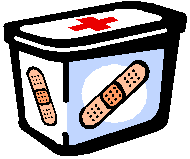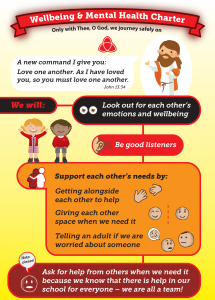
Health and Welfare
Health and Welfare Children make good progress when they feel well and happy. They are encouraged to trust us and to feel that they may confide in us. If something happens at home, which may worry your child, please let us know so that we…
Health and Welfare
Health and Welfare Children make good progress when they feel well and happy. They are encouraged to trust us and to feel that they may confide in us. If something happens at home, which may worry your child, please let us know so that we…
Health and Welfare
Children make good progress when they feel well and happy. They are encouraged to trust us and to feel that they may confide in us. If something happens at home, which may worry your child, please let us know so that we can help if we can. If you need help to solve a problem, please contact us. If we cannot help you ourselves, we may be able to put you in touch with someone who can.
If your child is unwell or has an accident in school, we will usually contact you. If your child has bumped their head, we will always notify you by either telephone or by sending a text and email and sending home a pink form. A child will also be given a specific ‘I have bumped my head’ sticker to wear if they have bumped their head so that adults monitor them more carefully. Our qualified First Aiders can treat minor injuries and will send home a yellow form specifying what treatment s/he has had, but they are not medically trained so a more serious injury may need hospital attention and we will contact you immediately. Please complete our Medical Questionnaire to let us have any medical information we need. This will be sent to you in July. Please send it with your child on their first day of admission.

Medicines
If your child is unwell, please keep them at home until completely recovered. Please inform us of any contagious infections your child may have contracted. If your child does need medicine during the day, perhaps to finish off a course of antibiotics, you need to fill in a form stating the dose etc., and these forms are available from the school office or from our website. Medicines should be prescribed and labelled for your child. Parents and carers must bring medication to the office and collect it themselves at the end of the day.
It is the responsibility of the parent to ensure that their child’s medication is within the expiry date.
Children with asthma have access to their inhalers at all times as they are kept in the classroom. In class we ask children to record when they have used their inhaler and these record sheets are sent home each half term so that parents and carers can monitor usage. If your child has asthma we also have a procedure for enabling an emergency inhaler to be used, and you will receive a letter about the protocol so that you can make an informed choice.
If your child has an epipen, please make sure that we have one in school. If your child has an epipen we also have a procedure for enabling an emergency epipen to be used, and you will receive a letter about the protocol so that you can make an informed choice.
The school nurse
The school nurse is employed by the National Health Service and visits from time to time. If you would like to see the school nurse an appointment can be made via the school office. They may be able to help with advice and sometimes run workshops which all parents are welcome to attend. There can be frequent outbreaks of head lice in most schools, so please check your child’s hair regularly. If you find head lice please treat the condition promptly to avoid it spreading. If you would like to have advice from the school nurse on this subject please let the office staff know and they will be able to make contact with her for you and plan an appointment.
If you are worried about your child’s health and welfare at school, please contact the office or class teacher.
Emotional wellbeing
“In order to help pupils succeed, schools have a role to play in supporting them to be resilient and mentally healthy….There are things schools can do – including for all their pupils for those showing early signs of problems and for families exposed to several risk factors – to intervene early and strengthen resilience…” DfE June 2014
As a school we aim to promote resilience and emotional and physical well-being across all elements of our curriculum. We recognise that some pupils and families may need extra support at times. To provide this we have a member of staff who is a trained ELSA (Emotional Literacy Support Assistant) .
In certain circumstances, children may also have 1-1 weekly sessions to help them through difficult periods, e.g. a bereavement. Some children have support for the whole four years that they are with us. Some children just go to see the ELSA from time to time for reassurance and a ‘little chat’.
We have a mental health charter for everyone in school

Safeguarding and Child Protection
The school has a child protection and safeguarding policy, available from the school office and on the website. There is a team of staff who are trained in being designated safeguarding leads. Mrs Robins the deputy head teacher is the main ‘designated safeguarding lead’ to speak to if there are concerns about any child being at risk. Mrs Gruffydd, the Head is also trained, as is Mrs Cooper the Special Needs co-ordinator. The designated governor is Mrs B Rogers. NB Mrs Savill is also trained as a designated safeguarding lead as this is a necessity to support the administration of the paperwork required.
Healthy Eating and Drinking
Children may bring a packed lunch, have a school dinner or go home for lunch. Meals are cooked on site are healthy and of a very high standard. Dinners can be paid for using our on-line system, ParentPay. To ensure that supplies are plenty, school dinners must be booked in advance, half a term in advance. Full details of how to pay will be given to parents as soon as the child is admitted to the school. Pupils who receive the Pupil Premium Grant may be entitled to a free school lunch. Even if your child only has school lunch occasionally this is worth applying for.
For packed lunch we suggest that parents follow DFE guidance issued in 2014 when the food standard for schools were last revised.
“The UK government produced packed lunch guidance to support the implementation of school food standards for school lunches and ensure that all children benefit from eating quality food during the school day. The guidelines are:
One portion of fruit and one portion of vegetable or salad every day to be included in packed lunches
Meat, fish or another source of non-dairy protein should be included every day. Non-dairy sources of protein include lentils, kidney beans, chickpeas, hummus, peanut butter and falafel
An oily fish, such as salmon, should be included at least once every three weeks
A starchy food, such as bread or pasta, rice, couscous, noodles, potatoes or other cereals, should be included every day
A dairy food, such as semi-skimmed or skimmed milk, cheese, yoghurt, fromage frais or custard should be included every day
Free, fresh drinking water should be available at all times
Include only water, still or sparkling, fruit juice, semi-skimmed or skimmed milk, yoghurt or milk drinks and smoothies
Snacks such as crisps should not be included. Instead, vegetables and fruit (with no added salt, sugar or fat). Savoury crackers or breadsticks served with fruit, vegetables or dairy food are also a good choice
Confectionery such as chocolate bars, chocolate-coated biscuits and sweets should not be included. Cakes and biscuits are allowed but these should be part of a balanced meal
Meat products such as sausage rolls, individual pies, canned meat and sausages / chipolatas should be included only occasionally.”
Thank you for your support in all these matters.
Nationally, a snack of fruit or vegetables is supplied free to every KS1 child daily. This is not the case at KS2.
Children are encouraged to bring a piece of fresh fruit for morning break and should have their own water bottle in school every day.
NB no nuts should be brought to school.
